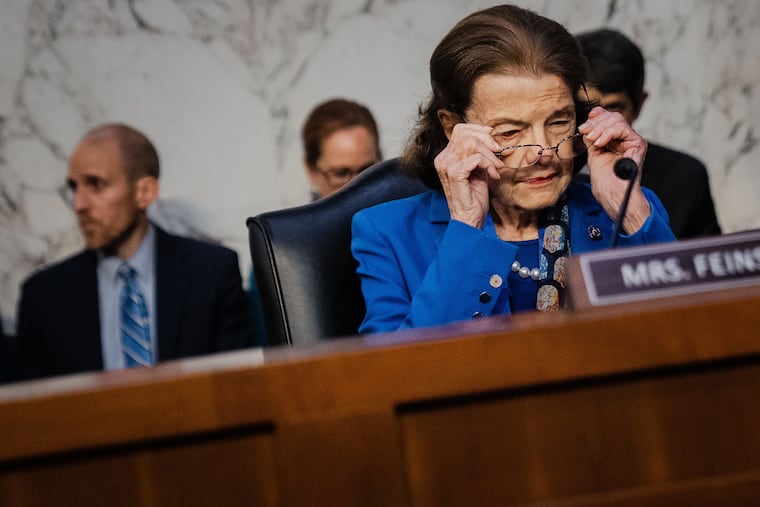As aging lawmakers refuse to step aside, the next generation waits — and waits | Editorial
The current Congress is one of the oldest ever. Legislators who balk at retirement undermine the health of democracy by slowing the succession of new leaders and ideas.

In his 1960 inaugural address, John F. Kennedy proclaimed that “the torch has been passed to a new generation of Americans.” More than a half-century later, many of today’s elected officials refuse to let the torch go.
Joe Biden, 80, is the oldest sitting president in history. Biden ran as a transitional leader in 2020 and is gearing up for reelection, even though 73% of registered voters think he is too old for a second term. Biden’s rambling comments about a John Wayne movie during a recent news conference in Vietnam further fueled the debate about his age.
Biden’s likely opponent, Donald Trump, 77, is just three years younger, and hundreds of psychiatrists have long questioned his mental health. As for his physical health, beyond lots of golf, Trump disdains exercise, enjoys fast food, and faces the stress of four indictments that could land him in prison.
The choice between old age and alleged criminality has left many voters uninspired.
Yet, the Oval Office is not the only senior center of power. The current Congress is one of the oldest ever. More than two dozen members come from the Silent Generation born between 1928 and 1945, long before most Americans were born.
Yes, Americans are living and working longer. But lawmakers who refuse to retire undermine the health of democracy by slowing the succession of new leaders and new ideas. In some disturbing cases, the graying of Congress has raised questions of whether lawmakers are fit to serve.
Sen. Dianne Feinstein (D., Calif.) is 90 years old and in failing health. She missed 91 votes during a three-month absence from the Senate. When Feinstein returned this summer in a wheelchair, she had to be nudged just to cast a vote.
Two years ago, the San Francisco Chronicle detailed how Feinstein’s staff performed many of her duties, while colleagues expressed concern about her shaky memory. Feinstein, who plans to retire at the end of 2024, has been an extraordinary public servant, but her inability to perform basic duties has marred her legacy and undermined trust in government leaders.
Senate Minority Leader Mitch McConnell (R., Ky.) is 81 years old and in poor health. He missed six weeks of work after suffering a concussion and rib injury following a fall in March. Last month, McConnell was briefly unresponsive during two different news conferences. Neurologists believe McConnell may be suffering small seizures, prompting some to say he should step down.
Rep. Nancy Pelosi (D., Calif.) did give up her leadership post in November, saying it was time for a new generation to steer the Democratic caucus. But Pelosi, 83, announced last week that she plans to run for reelection in 2024.
Even the leader for many young progressives is 81-year-old Sen. Bernie Sanders of Vermont. Sanders at least ruled out running for president in 2024 but remains entrenched into his fourth decade on Capitol Hill.
The octogenarians holding so tightly to power come as the country faces fast-moving events and seismic challenges. While age alone should not determine if someone is fit to serve, many Americans support term limits or a mandatory retirement age. Yet voters keep reelecting the same officials.
While many want Biden to step aside, it’s complicated. He has led the country through tumultuous times and has been a consequential president in his first term. More importantly, he’s an honorable leader who cares about the country and the Constitution — unlike his predecessor.
But it is fair to question if Biden is up to the relentless demands of leading the free world until age 86. Clearly, Trump is not qualified to be president at any age. The list of reasons is long, but see lying, corruption, pandemic mismanagement, the Jan. 6, 2021, insurrection, four criminal indictments, and the degradation of our country’s global standing, for starters.
However, youth and energy don’t always equal capability. One need look no further than Vivek Ramaswamy, the 37-year-old jabbering dilettante running for the Republican presidential nomination, to see this clearly. Ramaswamy is barely qualified to host a game show.
Fortunately, some leaders know when it is time to exit the stage. Sen. Mitt Romney (R., Utah) announced last week that he would not seek reelection in 2024. “It’s time for a new generation of leaders,” said Romney, who’s a comparatively youthful 76. “They’re the ones that need to make the decisions that will shape the world they will be living in.”
Other lawmakers should follow Romney’s lead.